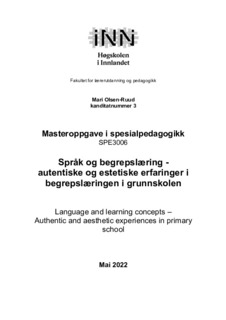| dc.contributor.advisor | | |
| dc.contributor.author | Mari Olsen-Ruud | |
| dc.date.accessioned | 2022-09-20T16:11:03Z | |
| dc.date.available | 2022-09-20T16:11:03Z | |
| dc.date.issued | 2022 | |
| dc.identifier | no.inn:inspera:111598093:37919995 | |
| dc.identifier.uri | https://hdl.handle.net/11250/3019326 | |
| dc.description.abstract | Språk omgir oss overalt og hvordan en forstår språkets prosesser og bakgrunn er ulikt. Vi lever i et stadig mer utfordrende samfunn i forhold til språklig samhandling, der denne er mer kompleks enn tidligere. Dette krever mer av den enkelte i forhold til forståelsen av begreper.
Hensikten med oppgaven er å se på begrepslæringen i skolen der det ubevisste gis oppmerksomhet. Problemstillingen er å se på hvordan det tilrettelegges for autentiske og estetiske erfaringer ubevisst og bevisst i begrepslæringen i grunnskolen. Julia Kristevas teorier om språk står svært sentralt. Det tas utgangspunkt i «the signifying process», der de to gjensidig avhengige delene av språket - det semiotiske og det symbolske inngår. Oppgaven redegjør for utvalgte og sentrale begreper og setter disse i sammenheng med oppgavens problemstilling.
I dagens samfunn får ofte det symbolske oppmerksomhet. Et begrep som brukes klarer ikke å uttrykke alt. Det vil alltid være noe ubevisst, noe usagt. Vi står i fare for å skape kopier, like mennesker – der språket stivner og låses fast i gitte strukturer. For å bidra til å unngå dette rettes blikket mot den ubevisste delen av språket, det Kristeva kaller det semiotiske. I de estetiske og autentiske erfaringene letes det etter semiotiske avtrykk og spor i hvordan deltakerne tilrettelegger undervisningen og hvordan man kan tenke begrepslæring i lys av Kristevas teorier. Studiet bygger på et kvalitativt forskningsopplegg der det er intervjuet og observert fire pedagoger. Forskningsopplegget egner seg godt til denne utforskningen, da målet er å studere fenomenet estetiske og autentiske erfaringer og hvordan disse tilrettelegges for i undervisningen til de utvalgte pedagogene.
Hovedfunnene viser at pedagogene ubevisst legger vekt på den semiotiske delen av språket i sin undervisning. Den semiotiske delen får ta større plass ved bruk av autentiske og estetiske erfaringer innenfor uteskole, kunstaktiviteter, musikk, dans, skriving av poesi og det å ta i bruk ulike sanser. Deltakerne er opptatt av lek og å utnytte øyeblikk, som igjen har innvirkning på det semiotiske språkets plass. Ved å se begrepslæringen i forhold til Kristevas teorier kan dette bidra til å utvikle, utvide forståelse og skape ny mening og betydning for den enkelte og samfunnet. Funnene er ikke fastlåst og må leses kritisk og i prosess. | |
| dc.description.abstract | Language is anywhere and everywhere. How you understand the background and processes of the language differs. We live in a challenging society, especially the speaking and communication with each other is more complex than before. This requires a lot more of a person’s understanding of the concepts. The purpose of this thesis is to look at and find out the learning of concepts at school where the unconscious is given attention. The research question is how the participants facilitate for aesthetic and authentic experiences unconscious and conscious in primary school. As an analytical framework the thesis builds on Julia Kristeva’s theories about language. Language is understood through Kristeva’s “signifying process”, where both parts - the semiotic and the symbolic - take place. Further the thesis explains the selected and important concepts and puts this in context with the research question.
The symbolic language is often given attention in today’s community. A concept or a word is not always enough to express everything. There will always be something unsaid, something unconsciously. We are risking making human “copies”, where all people are equal, having the same understanding of everything. Where the language is locked in given structures with no opportunity to evolve. To avoid this the focus is put on the unconscious part of the language, the part Kristeva calls the semiotic. The thesis is looking at how the participants facilitate for semiotic imprints or traces in their tuitions and how we can think concept learning in the light of Kristevas theories of language. The research program is qualitative, with interviews and observations of four pedagogues. This is a good choice since the purpose is to study a phenomen and find out something about how it occurs and behaves in specific situations with the selected participants.
Unconsciously the pedagogues prioritize the semiotic in their tuitions. It takes more place with use of aesthetic and authentic experiences within outdoor school, art activities, music, dance, writing of poetics and making use of various senses. To give the pupils opportunities to play and utilize the moments. “Here and now” is important for the participants. This seems to influence the semiotic aspect of the language and give it more space to appear. Kristevas theories can contribute the learning of terms with development, expanding the understanding and creating new thoughts for the individual and the society. Findings is not locked, and it must be read critically and in process | |
| dc.language | nob | |
| dc.publisher | Inland Norway University | |
| dc.title | Språk og begrepslæring - autentiske og estetiske erfaringer i begrepslæringen i grunnskolen | |
| dc.type | Master thesis | |
